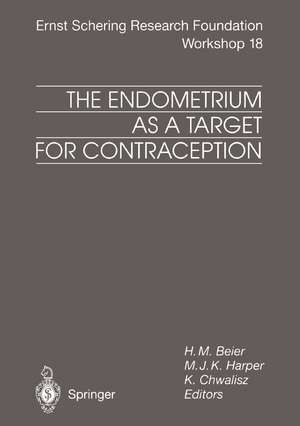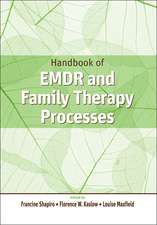The Endometrium as a Target for Contraception: Ernst Schering Foundation Symposium Proceedings, cartea 18
Editat de Henning Martin Beier, M.J.K. Harper, K. Chwaliszen Limba Engleză Paperback – 3 oct 2013
Din seria Ernst Schering Foundation Symposium Proceedings
- 5%
 Preț: 689.68 lei
Preț: 689.68 lei - 5%
 Preț: 679.49 lei
Preț: 679.49 lei - 5%
 Preț: 679.49 lei
Preț: 679.49 lei -
 Preț: 413.25 lei
Preț: 413.25 lei - 5%
 Preț: 346.83 lei
Preț: 346.83 lei - 5%
 Preț: 719.05 lei
Preț: 719.05 lei - 5%
 Preț: 1049.13 lei
Preț: 1049.13 lei - 5%
 Preț: 719.05 lei
Preț: 719.05 lei - 5%
 Preț: 353.88 lei
Preț: 353.88 lei - 5%
 Preț: 348.42 lei
Preț: 348.42 lei - 5%
 Preț: 686.69 lei
Preț: 686.69 lei - 5%
 Preț: 350.52 lei
Preț: 350.52 lei - 5%
 Preț: 686.50 lei
Preț: 686.50 lei - 15%
 Preț: 610.01 lei
Preț: 610.01 lei -
 Preț: 368.23 lei
Preț: 368.23 lei - 5%
 Preț: 351.05 lei
Preț: 351.05 lei -
 Preț: 369.74 lei
Preț: 369.74 lei - 5%
 Preț: 349.65 lei
Preț: 349.65 lei - 5%
 Preț: 349.82 lei
Preț: 349.82 lei - 5%
 Preț: 351.40 lei
Preț: 351.40 lei - 15%
 Preț: 605.78 lei
Preț: 605.78 lei - 5%
 Preț: 356.17 lei
Preț: 356.17 lei - 5%
 Preț: 347.89 lei
Preț: 347.89 lei - 5%
 Preț: 1046.69 lei
Preț: 1046.69 lei - 5%
 Preț: 694.44 lei
Preț: 694.44 lei - 15%
 Preț: 613.80 lei
Preț: 613.80 lei - 5%
 Preț: 349.65 lei
Preț: 349.65 lei - 5%
 Preț: 1354.14 lei
Preț: 1354.14 lei - 15%
 Preț: 615.35 lei
Preț: 615.35 lei - 18%
 Preț: 1332.46 lei
Preț: 1332.46 lei - 5%
 Preț: 687.05 lei
Preț: 687.05 lei - 5%
 Preț: 1054.06 lei
Preț: 1054.06 lei - 5%
 Preț: 1050.18 lei
Preț: 1050.18 lei - 5%
 Preț: 353.69 lei
Preț: 353.69 lei
Preț: 352.64 lei
Preț vechi: 371.20 lei
-5% Nou
Puncte Express: 529
Preț estimativ în valută:
62.39€ • 72.69$ • 54.48£
62.39€ • 72.69$ • 54.48£
Carte tipărită la comandă
Livrare economică 19 ianuarie-02 februarie 26
Preluare comenzi: 021 569.72.76
Specificații
ISBN-13: 9783662103258
ISBN-10: 3662103257
Pagini: 304
Ilustrații: XV, 284 p. 129 illus., 5 illus. in color.
Dimensiuni: 148 x 210 x 16 mm
Greutate: 0.36 kg
Ediția:Softcover reprint of the original 1st ed. 1997
Editura: Springer Berlin, Heidelberg
Colecția Springer
Seria Ernst Schering Foundation Symposium Proceedings
Locul publicării:Berlin, Heidelberg, Germany
ISBN-10: 3662103257
Pagini: 304
Ilustrații: XV, 284 p. 129 illus., 5 illus. in color.
Dimensiuni: 148 x 210 x 16 mm
Greutate: 0.36 kg
Ediția:Softcover reprint of the original 1st ed. 1997
Editura: Springer Berlin, Heidelberg
Colecția Springer
Seria Ernst Schering Foundation Symposium Proceedings
Locul publicării:Berlin, Heidelberg, Germany
Public țintă
ResearchCuprins
1 The Molecular Biology of Progesterone Receptors: Why Are There Two Isoforms?.- 2 Hormonal Regulation of the Paracrine Growth Factors HGF and KGF in the Endometrium of the Rhesus Macaque.- 3 Cell Biological Aspects of the Implantation Window.- 4 The Immune System Acting in the Human Endometrium.- 5 Cytokines and Their Receptors in the Peri-implantation Endometrium.- 6 Metalloproteinases and Regulation of Endometrial Function.- 7 Novel Cell Adhesion Molecules: Roles in Implantation?.- 8 The Glycoprotein MUC1 and Extracellular Matrix Molecules as Markers of Endometrial Differentiation.- 9 Intrinsic and Extrinsic Hormonal Influences Contributing to Endometrial Receptivity in Normal Reproduction and After Ovum Donation.- 10 Clinical Significance of Integrin Cell Adhesion Molecules as Markers of Endometrial Receptivity.- 11 Endometrial Contraception with Progesterone Antagonists: An Experimental Approach.- 12 Clinical Strategies for the Achievement of Endometrial Contraception with Progesterone Antagonists.- Previous Volumes Published in this Series.
Textul de pe ultima copertă
This book is a summary of the present state of the art in the physiology of both endometrial receptivity and implantation. Although these physiological processes are today considered as limiting factors responsible for both infertility and low gestation rates in patients undergoing assisted reproductive techniques, they may, on the other hand, represent future targets for contraception. Several aspects of endometrial receptivity and implantation are discussed in this book. In the first part, basic aspects of the cell biology of endometrial functions as well as the molecular aspects of endometrial receptivity and implantation are discussed. Subsequently the clinical and experimental approaches to endometrial contraception are considered. Finally, some basic questions are raised pointing to the need for further research in order to gain a better understanding of the implantation process and the development of new contraceptive strategies, including the inhibition of endometrial receptivity. The organizers of the workshop and the editors of the volume hope that this book will encourage both universities and the pharmaceutical industry to initiate and/or continue research on endometrial receptivity and implantation.















